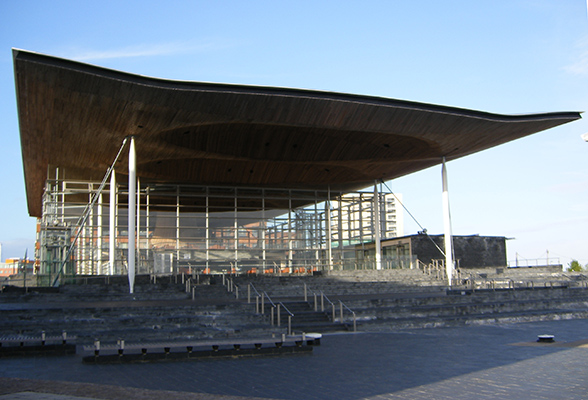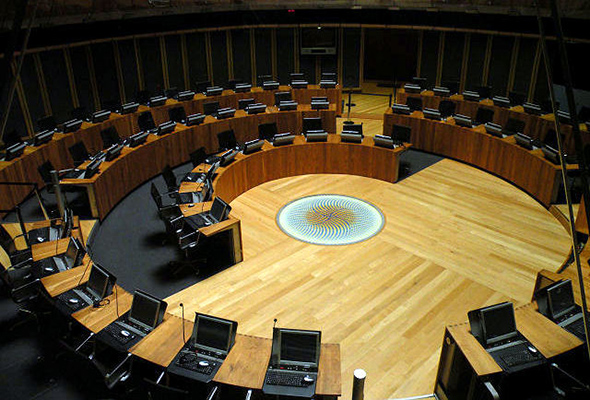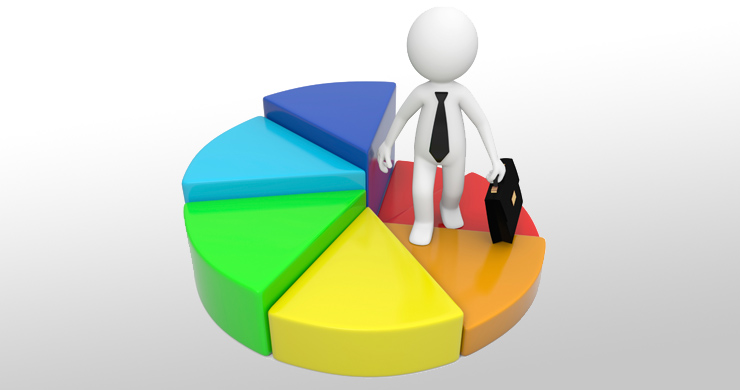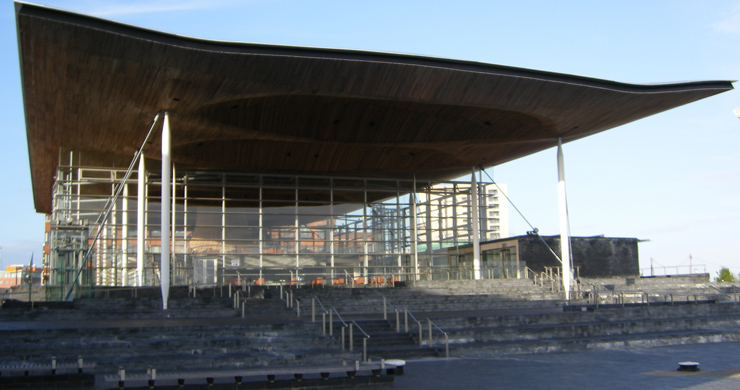The Welsh Government and the National Assembly for Wales
In 1997 there was a referendum in Wales in which the people had a choice on whether Wales should have its own parliament which was later named the National Assembly. This process was called devolution; this is when power is spread out from a central point such as from the Westminster Government to regional governments such as those now in Cardiff, Belfast and Edinburgh.
After the yes vote in 1997 the Government in Wales Act 1998 set up the legal framework which created the National Assembly for Wales. The first elections were in 1999 followed by 2003, 2007 and 2011.

Image: Senned National Assembly for Wales © Wikimedia Commons under All rights released
At first the National assembly was different from nearly every other parliament in the world in that there was only the National Assembly; there was no difference between legislative and executive actions. Legislative means the debates, discussions and votes taken by all members; executive means the day to day decision making and policies. As a result of this there was some confusion on roles and who should be doing what, as a result there was a need to clearly separate these two functions.
Legal separation took place after the 2007 election of the National Assembly for Wales. It was based on the Government of Wales Act 2006 which clearly defined the different roles and responsibilities between the National Assembly for Wales made up of the 60 assembly members, and the Welsh Government made up of the First Minister, Welsh Ministers, Deputy Ministers and the Counsel General.
Separation was important to make the different roles of the assembly and the government very clear.
- The role of the government is to make decisions; develop and implement policy and make statutory instruments (Welsh laws).
- The 60 assembly members in the National Assembly scrutinise (look at and debate) the Welsh Government's decisions and policies; hold ministers to account and approve budgets.
At first the National Assembly did not have any real law making powers as these were retained in Westminster.
However after a referendum in March 2011 Wales gained direct law making powers. Over devolved areas, these were established in 2006 and are:
- Agriculture, fisheries, forestry and rural development
- Ancient monuments and historic buildings
- Culture
- Economic development
- Education and training
- Environment
- Fire and rescue services and promotion of fire safety
- Food
- Health and health services
- Highways and transport
- Housing
- Local government
- Public administration
- Social welfare
- Sport and recreation
- Tourism
- Town and country planning
- Water and flood defence
- Welsh language

Image: Debating chamber, Y Senedd - Keith Edkins © Wikimedia Commons under Creative Commons Attribution-Share Alike 2.0 Generic
The Welsh Government and Assembly have mostly campaigned for more powers over new areas such as policing and energy as well as more fiscal powers which means to do with money and the Welsh Government has wanted powers over certain taxes and also wants to be able to borrow money.
Between 2006 and 2011 ‘laws’ passed by the National Assembly were called Measures of the Assembly but after the 2011 referendum when the Assembly received more powers they are termed Acts of the Assembly exactly the same name as the Acts of parliament passed in Westminster.
In 2015 the Welsh Government introduced a new law to create an organisation to collect taxes in Wales. This was passed in March 2016 and created the WRA (Welsh Revenue Authority) which will collect new taxes here in Wales. The first two taxes being devolved are called the land transaction tax (paid when buildings and land are bought and sold) and the landfill disposals tax paid when waste is buried in a landfill site. Other taxes such as business rates, corporation tax and even income tax are being discussed as possibly being devolved in the future.
So the Welsh Government and the national Assembly for Wales already has a large amount of control over our lives here in Wales. This is especially true for younger people where education, housing, health, sport & recreation tend to cover most aspects of their lives and are already devolved.
Pupil Activity
Look carefully at the list of devolved powers in Wales.
Think about what things are important in your life; make a list in order of importance; most important first.
Put a tick next to each one which is a devolved area of power.
Related Articles...

